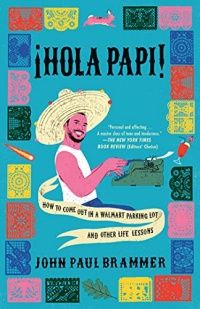How ¡HOLA PAPI! Helps Me Navigate My Queerness
¡Hola Papi! was not something I was looking for while browsing through my Goodreads recommendations on a Sunday night. Oblivious of the author’s popular advice column before deciding to give it a chance, what got me enticed was the catchy title, which is, for me, sounds flirtatious and cheeky. It makes me think of a hot summer night in a Las Ramblas bar, checking out that alto and guapo Spanish tío. But it’s not the tongue-in-cheek commentary I was hoping for, nor a rare guide on how to date that kind of man. Instead, it’s the author’s memoir, recounting his harrowing experiences growing up as a Chicano gay man in a white neighborhood.
After breezing through it in March, I realized that the author and I have had many similar experiences in life.
Sometimes a book comes into your life at the right time. Like when my Mexican best friend and I decided to become strangers, I found comfort in reading Rilke’s works. Now, as I finally came to terms with my sexuality, ¡Hola Papi! helps me navigate the scary and unknown queer world.
I am a late bloomer in my late 20s. During my college days, and the following years after that, I did nothing but focus on my studies, find a not-so-shitty job churning out words, and earn enough to live a comfortable life. Like Brammer, I came from a traditionally religious family; it was unfortunate that I was heavily indoctrinated into a religion I don’t even believe in, which somewhat skewed my mind and affected the way I think today. Like Brammer, I also felt critical of myself: I had developed internalized homophobia thanks to my religious upbringing.

In ¡Hola Papi!, Brammer recalls memories of childhood growing up in rural Oklahoma: how he was bullied, denied his sexuality, and came to accept himself eventually. He also shares stories about the men he dated and fucked — no holds barred. Some of these men he loved, and some deeply hurt him. And I like how raw, honest, and vulnerable it all is.
The parallels between our lives go beyond these, though.
In March, I got chatted up by a stranger on an app. I thought we hit it off because they were so into me, and I into them. We made plans to hang out very soon. But while I was clearing up my schedule and waiting for their next text for the day, I noticed that our conversation suddenly disappeared. Confused, I closed the app and reopened it again. Nada.
They deleted their account.
I think they ghosted me. I was shocked and angry and disappointed. I looked for ways to make me feel instantly better at the time. Then I frantically searched for my Paperwhite to load up ¡Hola Papi! and read a line I highlighted not long ago: “Sometimes…you have to just let a person roll down to the mouth of your driveway, turn their blinker on, and go,” Brammer writes after letting go of someone they once dated. Heavily sighing, I felt somewhat relieved by letting go of this person who promised me good things.
Reading Brammer’s part essay and part memoir definitely brings comfort in the most unstable time of my life. In some ways, the book packs wisdom for young queer folks like me. Right now, as I am riding a phase in my life wherein I want to explore further, it feels liberating to not be shackled by social constructions anymore. To think that nothing is wrong with me and nothing is wrong with what I identify as is so powerful. ¡Hola Papi! gives me a clearer picture of what to expect in this queer journey. I know that there would be good times and bad times. And there would be more and more heartbreak along the way, but at least I know that I will not be alone in this universal human experience.
I’m glad that ¡Hola Papi! came into my life when I need it most, when I am just about to embark on a new and scary experience. Thanks to papi, I think I’m going to have a life “con mucho amor.”

إرسال تعليق
0 تعليقات